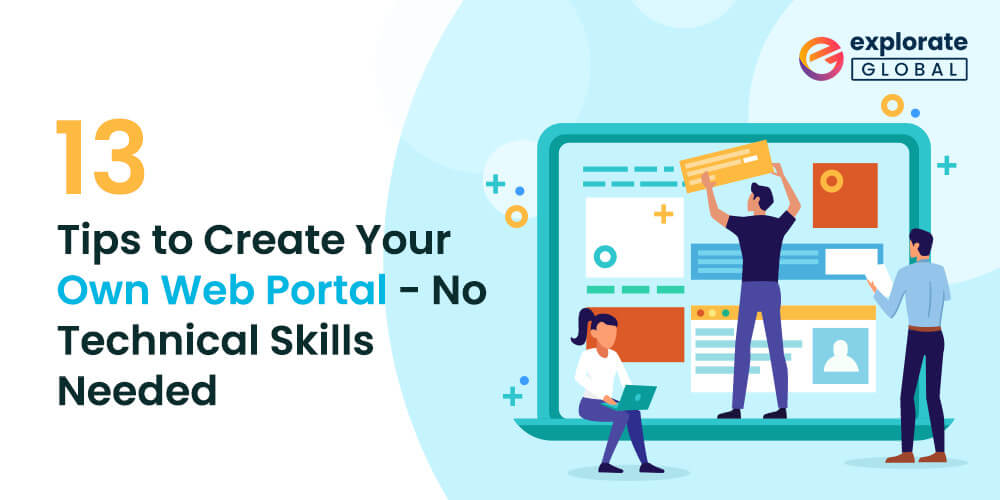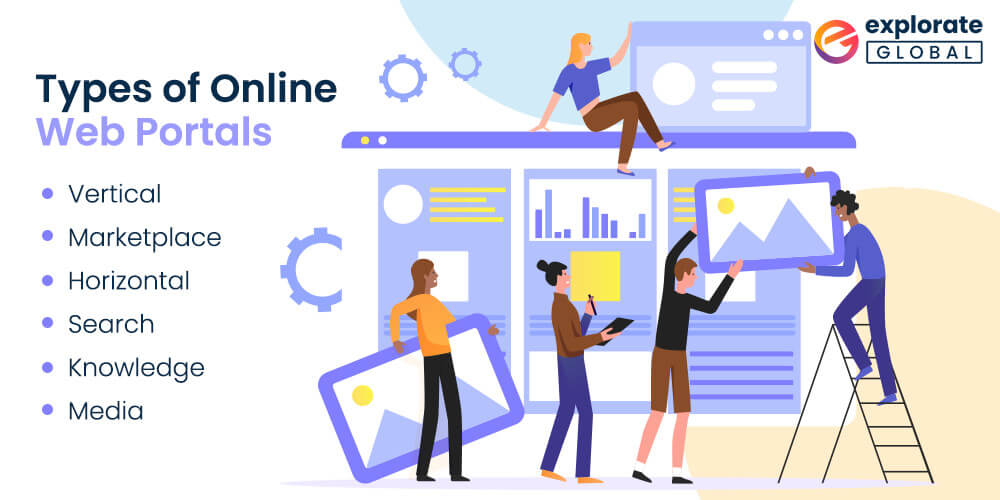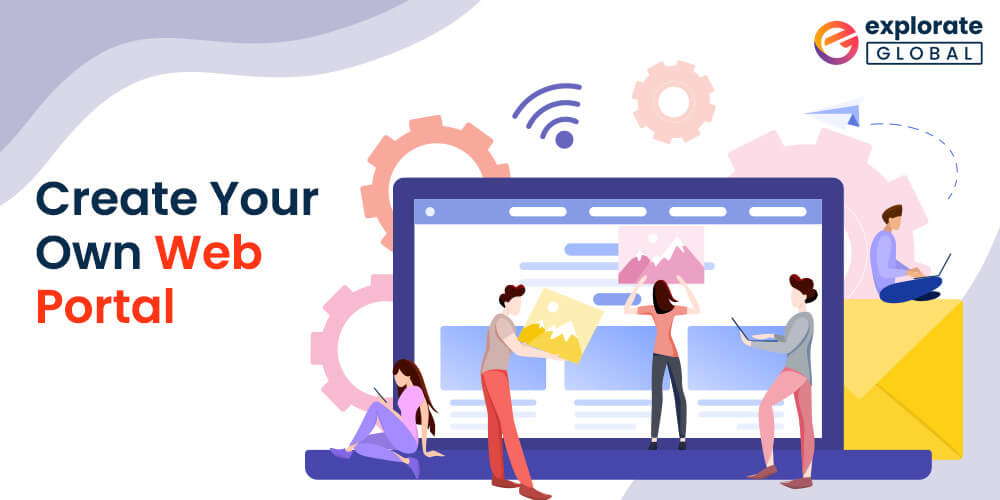
Several corporate and eCommerce agencies have their own Web Portals to facilitate their customers, employees, and suppliers with everything they need to know about the company details, products, and services.
What is a Web Portal?
A Web Portal is a gateway to personalized information. It is a website but with a wider overview, it is rather a one-stop platform where you could easily get access to information that you are concerned with (with or without a Login).
Let’s get this straight with an example, Amazon – the renowned shopping website. It is a web portal that facilitates the entire access of information related to products, services, company policies, terms of services, and much more. The information can be accessed with a Login.
A web portal is simply an up-gradation of a static website and it is surely a worthy investment for a firm. Eventually what you need is a precise Web portal design and a responsive user interface to replace a static website with a much-advanced version.
For business owners who are willing to own a Web Portal, here is a silver lining for you. The write-up is dedicated to giving the pro tips on conveniently building a ‘Web Portal.’
Before sprinting to the tips, let us first know the types of web portals which will help you clear your vision regarding the online Web Portal you want for your business.
6 Types of Online Web Portals

Vertical Web Portal
Such portals primarily focus on a single, industry, domain, or vertical. The entire info (articles, news, stats, and researches) related to the specific industry will be delivered without fail. These online portals mainly aim at facilitating the transition of information to enhance transparency within a particular industry. Outsiders with a login can access the information.
Marketplace Web Portal
As the name suggests, it is an online marketplace that supports the B2B and B2C trades. All eCommerce websites fall under this category. The web portal interests the purchasers, the vendors, suppliers and the backend support. The platform lets the aforesaid parties interact and trade. Examples: Amazon, Flipkart, eBay, etc.
Horizontal Portal
The Web Portal that lets you have access to any A to Z information. Unlike the Vertical Portals, Horizontal Portals are not confined to a single sphere. These are like search engines for users. Examples: Yahoo, MSN, AOL etc. if you hear the term ‘mega portals’ the reference is Horizontal Portals.
Search Web Portal
The term is even wider than ‘Horizontal Portal’. Search Portals accumulate and present on the single platform the entire information from various search engines. Never needs a login for access. The best example for such a portal is Google.
Knowledge Web Portals
Just limited to imparting knowledge related to processes of the company. This in-house portal usually interests the employees that are working for the company. Information is authenticated with a Login. This type of portal usually interests companies with multiple outlets inter or intrastate.
Media Web Portal
For people searching for news or current affairs, Media Portal is the landing website. It possesses each and every piece of information related to business, politics, finance, consumer segment, etc. Examples are BBC, TOI, Reader’s Digest, etc.
Every type has a different goal to achieve, now you have to analyze your business goals and intersect with which type of portal and carry on with the making of your own business portal.
13 Tips To Create a Web Portal Without Any Technical Skill

1. Know Your Market
The point tops my list because all the other steps could only be taken once this is accomplished. You should be well versed in the nature of your business and the market associated with it. Your personal goals, the stirs in your industry, your competitor’s approach, and the current trends. This will help you build a more optimized and business-oriented web portal.
2. Target Audience Analysis
Always keep a track of your target audience. What makes them land on your website? Will their motive be fulfilled here itself?
Don’t let them wander to other websites, being a business this could be a drawback you wouldn’t want. Keep a grip on their requirements as this will help you bridge the gap between supply and demand.
3. Clear Your Goals from the Portal
What are your personal benefits from the portal? Whether you are trying to elevate your sales (e-commerce portals) or you are trying to keep the transparency of information with your company (knowledge portals) or you are simply facilitating the users with general information like a search engine (horizontal/media/search portals).
4. Know the Features To Be Incorporated
Customize your portal with more and more features. In a business portal one can incorporate Chatbots for Customer service, photo gallery, newsletters, advertisements, best buys, customer profiles, and more.
5. Trigger the Needs of Your Target Audience
After all, it is your audience who will judge your services. Keep the knack of your audiences’ current needs and symmetrically customize your business web portal. Just a simple mantra, what your audience is seeking and what you deliver should click. Additionally, try to stand out of the crowd with your services and the same will differentiate you in the market. The trick always works with retaining the existing clients and increasing your clientele.
6. Hire the Right Resource
Technical arena is where you lag behind. Just hire the right resources, explain to them your needs and let them input their technical expertise in your project. Your market knowledge and their technical expertise together can fetch just the desired outcomes.
7. Select an efficient Web Portal Software
Being a business, your preference might incline towards open-source web portal scripts. Your technicians will suggest you the best but for your prior knowledge, you can go with UPortal, Osclass, DotNetNuke, Dolphin and Liferay. Discuss these with your software developers.
8. Portal Design should justify your business
Let your web portal speak volumes about your business and the services you are giving to your potential clients. Keep it simple and to the point. Simple and User-friendly UI is the only key to retain your clients.
9. Focus on Functionality of the Portal
Our ultimate goal is to get sales and that is possible only when the site is responsive and it fulfills the objectives of the users landing on the portal. The more optimized portal the less are the bounce rates for your website.
10. Timely maintenance is Inevitable
Your Job starts with the development of the website. Customizations, regular updations, and Maintenance and support are a must to keep your web portal trending and most sought after among your target audience. This step will help you achieve milestones in the long run.
11. Customer Privacy
This is the crucial step. Customers (if agreeing to our policies and signing up) are relying on us related to the privacy of their personal information. If you want to own a member login area make sure you have concrete preparations beforehand. This step questions your credibility towards your customers.
12. The consumer is the King
Any inconvenience to the customers will put a direct question mark on your brand’s goodwill. Remember Consumer is the king. Everything from scratch to end (services or information) should be apt, negligence here is risky.
13. Marketing is Very Important
Last but not the least, ‘marketing’. Promote your web portal on social media marketing through visual content, blogs, articles. Let people know you are in the market with one of the best solutions for their demands (products, services, or any other information). Invest some time in building digital marketing strategies, often what is displayed nicely is acquired by the public.
The End Note
Owning a web portal is no doubt an upper hand for a certain firm as it is better than a static website with limited information (in my opinion). If your business requires a Web portal the very first step is to seize one for you. A web portal is a key to future profits, but only when every step is taken with the vision of the future in mind.
The final verdict – whether it’s a third-party website development company or a freelancer, you and they should align on the same ideas and goals while creating your dream web portal.



Thanks for Sharing!
Excellent Post!
Hi,
Thank you for sharing this valuable content. I am not from a technical background and your post really helped me to create a web portal on my own. I am in the process of developing it.
I am very thankful to you for sharing these tips to create a web portal by own. I tried to build my own web portal as per your recommendation and it really helped me to create one.